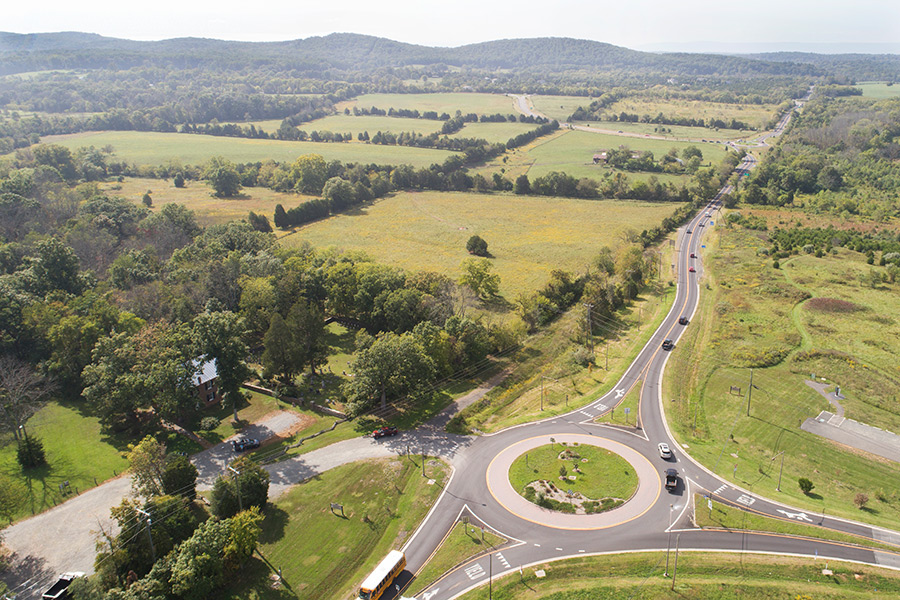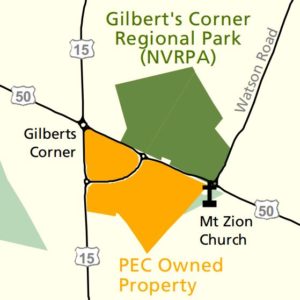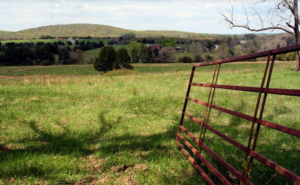
Over a 20 year period, The Piedmont Environmental Council has played a leadership role in preserving the historic and scenic landscape at Gilberts Corner. This Rte. 15 & 50 corridor serves as the symbolic gateway to the Piedmont; essentially a transition point between suburban and rural Loudoun County. PEC has defined the vision, forged the partnerships, created the policy framework and actively engaged in a series of conservation transactions covering some 326 acres that is designed to preserve the rural character of Gilberts Corner.
Background of the Property
Over a 20 year period, The Piedmont Environmental Council has played a leadership role in preserving the historic and scenic landscape at Gilberts Corner. This Rte. 15 & 50 corridor serves as the symbolic gateway to the Piedmont; essentially a transition point between suburban and rural Loudoun County. PEC has defined the vision, forged the partnerships, created the policy framework and actively engaged in a series of conservation transactions covering some 326 acres that is designed to preserve the rural character of Gilberts Corner.

In 2013, PEC accepted a gift from Roundabout Partners LLC of a 141-acre farm property located in the area due southeast of Gilberts Corner. This property, named Roundabout Meadows in 2016, offers a variety of natural, historic, scenic, and cultural resources. Roundabout Meadows has been historically used as a working cattle farm and is currently leased to local cattle farmers. The pastures have become considerably degraded after years of intensive grazing and the cattle had been allowed to access Howser’s Branch for water, which has caused significant water quality issues that extend beyond the property boundaries.
PEC has developed a robust management plan to restore pasture and soil health, water quality, wildlife habitat and also create a sustainable vegetable production operation. In Fall 2016, PEC completed the first major restoration project on the farm by installing over 2 miles of fencing, which will prevent livestock from entering the property’s waterways. Additionally, the farm is also serving as a demonstration site. PEC hosts outreach activities for local landowners and farmers that showcase agricultural and stewardship best management practices that have been implemented on the farm.
Grazing plan + NWSG Restoration of 12-acre pasture

A grazing plan for the property has been developed that will help restore pasture forage and soil health by optimizing rotational grazing methods. The property contains 4 large pasture areas that encompass roughly 62 acres. All of the fields are comprised mainly of cool-season pasture grasses. One of these pastures has been targeted to be restored to a native grassland.
During the summer months, livestock are hard-pressed to find nutritious forage. The typical cool-season pasture grasses (mainly fescue) cease growing during the hottest times of the year. In contrast, the growth period of native warm-season grasses, which are adapted to Virginia’s climate, occurs during the summer. By restoring a native grassland on the property and incorporating it into the grazing system, livestock will be provided with nutritious forage year-round.
Native warm-season grasslands are also extremely valuable to many wildlife species, some of which only occur in native North American grassland ecosystems. Grasslands rely on frequent disturbance to persist, which usually takes the form of fire or grazing. As a result, this restoration project will benefit both livestock and wildlife:
- PEC is currently researching the feasibility of instituting an educational farm on all or part of the site. The ed farm would be run by a farm manager and worked by volunteers. All produce would be donated to local food banks. The option of leasing part of the site to a local vegetable farmer is still an option that we are considering.
- Create a diverse production that will integrate pollinator/wildlife habitat, soil conservation methods and veggie production into one holistic system.
- Improve soil health through natural methods (composting, rotating beds, etc.). Minimize pesticide and fertilizer use by creating strict guidelines. If part of the site is leased to a veggie farmer, pesticide/fertilizer restrictions and bmps will be included in the lease.
- Emphasis on community education. Hold workshop for new farmers on site. Workshops would be on topics that reflect the site’s bmps and techniques. Ed farm would provide an opportunity for potential internships and other educational opportunities for volunteers and school-age children.
- Restoration of Wildlife Habitat and Wetland area.
Updates
- Fall 2016 update: Over 2 miles of riparian fencing was installed! Read more >>
- Spring 2014 update: Conservation milestone at Gilbert’s Corner. Read more >>
